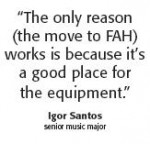SYCOM remains distant from music department

Even though plans have not been drawn up and the ground has not been broken for a new music building, one thing is already set in stone for the much-awaited project: The electronic music department won’t be in it.
SYCOM, which stands for System Complex for the Recording and Performing Arts, has never been in the same building as the music department, in fact.
Since its creation in 1972, the University’s electronic music department has been located in the basement of the Theatre Arts Rehearsal (TAR) building.
Professors and students complain that the disconnect is an inconvenience and that it hampers collaboration within the department. Some have voiced concern over the arrangement since the College of Visual and Performing Arts recently determined that there’s enough money to build a new music building.
“It’s apart from the music department, my office is here (the basement),” said Paul Reller, the director of SYCOM. “I have to walk half a mile to get my mail or go to meetings.”
When – and if – the new music building is built, the music department will leave the Fine Arts (FAH) building they share with the art department. SYCOM will leave the basement of TAR and move in with the art department, while the theater department will take over its whole building.
“The disappointing thing to me is that I have been so disconnected from the music department, since SYCOM has been down here for 35 years,” Reller said.
SYCOM students have mixed feelings about their department not being part of the new music building.
“The only reason (the move to FAH) works is because it’s a good place for the equipment,” said Igor Santos, a senior majoring in music with a concentration in acoustic composition and electronic music.
“But I wish it was in the music building because that way more musicians would be more aware that it exists. A lot of musicians don’t even know SYCOM exists.”
“We feel worried about moving the equipment or it will be a worse place for future students to compose, but if they give us a decent place I guess that is okay. Apparently there is nothing we can do about it.”
“I think the (old) building says a lot about the school and that turns people away in that sense,” said Jose Cochez, a junior majoring in jazz performance and electronic music. “I am really disappointed that we will not be a part of the new building.”
Christopher Ferguson, a senior majoring in acoustic composition and electronic music, thought SYCOM’s current location was inconvenient, but wasn’t looking forward to a move.
“It’s kind of strange sometimes, because we are so far away from performers and classmates,” he said. “But at the same time it’s a really good spot to get a lot of work done. I really couldn’t think of a better spot on the campus to set up these studios. Another concern in moving is we have a lot of equipment that has been a staple of this studio since it’s been around.”
Ron Jones, dean of the College of Visual and Performing Arts, oversees the music, art and dance departments. He maintains that equipment is not as important as collaboration between SYCOM and the fine arts departments. In his view, the fact that SYCOM shares technology with fine arts makes the new arrangement a logical choice.
The SYCOM department does not have to worry anytime soon, though. The idea of a new music building has a long history. A retired faculty member was promised there would be a new music building within the next year – when she was hired 32 years ago, Jones said. The building was the No. 1 priority; however, other projects like the Sun Dome renovation and the new Marshall Center have bumped it down the list.
On Jan. 10, it was determined that there is enough money available to construct a building to meet the music department’s needs – and desires.





